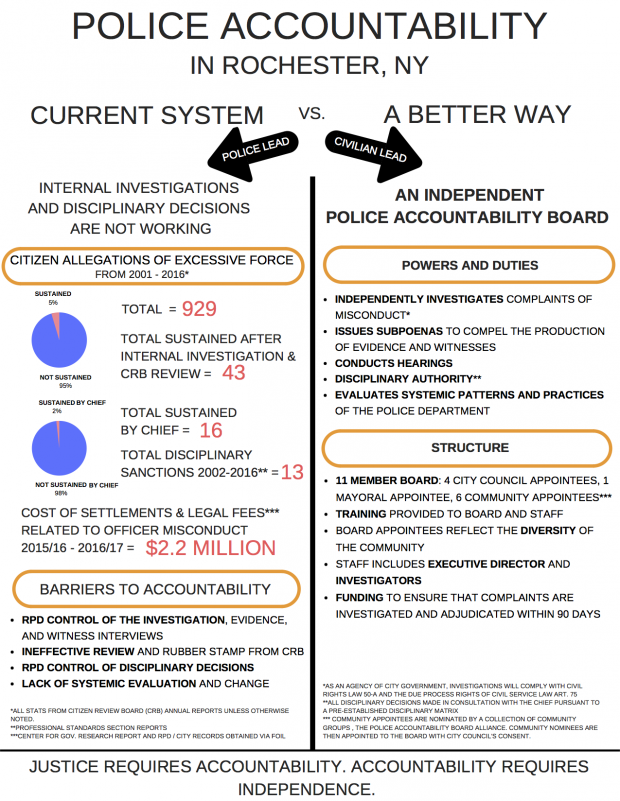Enough Is Enough: "Achieving Police Accountability in Rochester: Clarifying misconceptions and adding commentary to the report on police oversight commissioned by City Council"
Primary tabs
Attached is the Enough Is Enough response to the Center for Governmental Research paper that reviewed the civilian oversight of police processes in Rochester, NY. Achieving Police Accountability in Rochester Clarifying: misconceptions and adding commentary to the report on police oversight commissioned by City Council was released publicaly at a press conference held by the group and its allies on February 20, 2018.
1 Introduction
In February of 2017, Enough Is Enough (EIE) and the Rochester Coalition for Police Reform, jointly released The Case for an Independent Police Accountability System: Transforming the Civilian Review Process in Rochester, New York (hereafter “PAB report”). The report, authored by Barbara Lacker-Ware and Theodore Forsyth, reviewed the process for civil- ians to make complaints regarding police misconduct. The researchers looked at annual reports from the Professional Standards Section (PSS, the Rochester Police Department’s internal affairs division) and the Civilian Review Board (CRB) administered by the Center for Dispute Settlement (CDS) as well as reports of racial profiling and police misconduct by members of the community. According to CRB annual reports (2001-16), of the 929 civilian- generated allegations of force over 16 years, the Chief of Police sustained only 16 of them (1.7%). According to PSS annual reports (2002-16), there were only 13 instances of officer discipline stemming from such allegations. Of those, the harshest were six suspensions.1
The PAB report as well as several high-profile cases of police brutality in the news, prompted City Council to thoroughly investigate the process used by civilians who have experienced police misconduct. City Council contracted with the Center for Governmental Research
(CGR) to conduct an independent review. Simultaneously, City Council used its subpoena power for the first time to review the PSS investigation of the claims made by Rickey Bryant Jr., a minor who was brutalized by over a dozen officers in a case of apparent mistaken identity as he was riding his bike in the summer of 2016. Although Mr. Bryant was never charged with a crime, he sustained severe injuries, for which the police were not held accountable.
On June 20, 2017, Rochester City Council approved a contract with CGR specifically to review “the functioning and outcomes related to civilian complaints about police conduct, and how they have been handled/disposed of by PSS, CRB, and the Chief of Police,” as well as “information on best practices and options to consider for civilian oversight of police, based on a review of practices in other New York cities.”
A draft of CGR’s report, Police Oversight In Rochester: An Examination of Outcomes and Other Models (hereafter “CGR report”), was completed by the end of September 2017, whereupon City Council requested more information. CGR then presented their report to City Council on November 30, 2017. The report was released to the public that night by the city of Rochester on their website.
Members of EIE have reviewed the CGR report and found several issues that warrant a response. Specifically:
Contrary to common misconceptions, state law does not preclude the proposed Police Accountability Board from disciplining officers.
Analysis of the data concerning the current civilian review process needs to focus specifically on the most serious allegations: those filed by civilians concerning use of force.
The relevant outcomes must go beyond sustain rates and include whether al- legations of misconduct ultimately result in discipline for the officers involved. Presently, civilian-initiated allegations of force rarely result in discipline (only 13 instances over the period 2002-16). Disciplinary power needs to be an essential feature of the proposed PAB.
The Syracuse Citizen Review Board, which has independent power of investi- gation, sustained significantly more civilian-initiated allegations of force than Rochester’s CRB (four times more often over the period 2013-16). Independent investigatory authority needs to be an essential feature of the proposed PAB.
We are hopeful that City Council will evaluate and prioritize these concerns in the legislation that is ultimately enacted.
1The PAB report analyzed CRB reports over the period 2001-15 and PSS reports over the period 2002-16. Here we have also included the data for 2016, which has since become available.
The photo below was an infographic developed by Enough Is Enough to clarify the current process of police oversight in Rochester, NY and the proposed Police Accountability Board:










